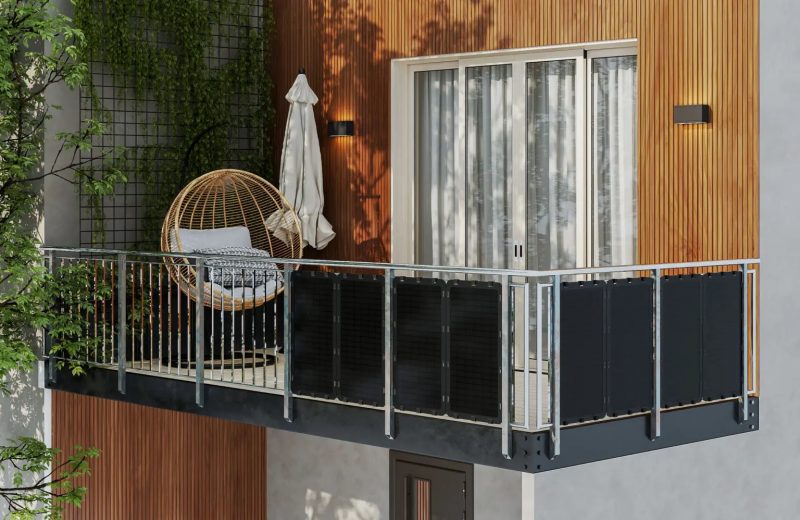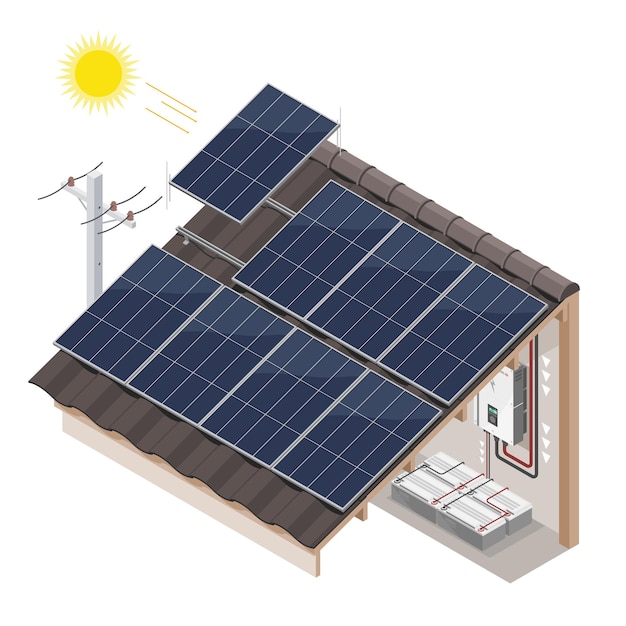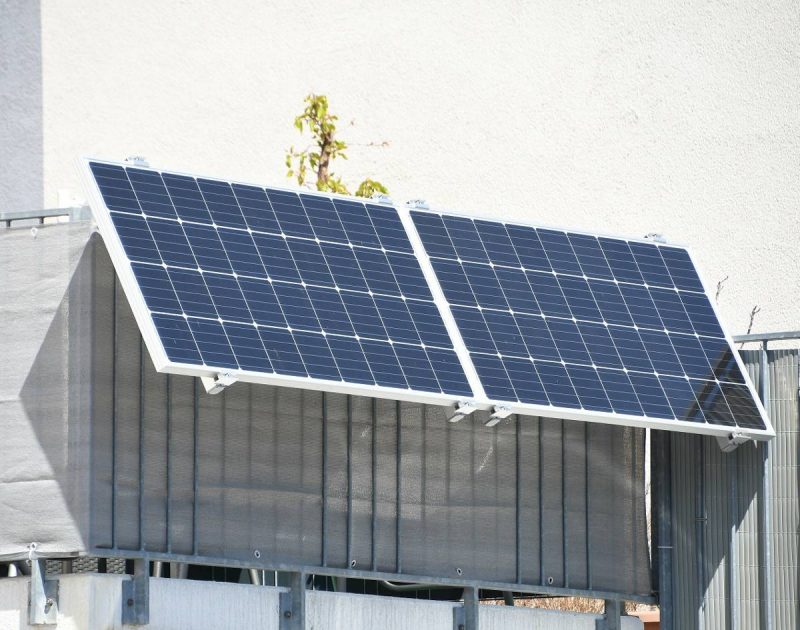Contents
- Types of Balcony Solar Panels
- 1. Plug-in Solar Panels
- 2. Mini/Microinverters
- 3. Grid-Tie Systems
- 4. Ground-Mounted Systems
- The Advantages of Balcony Solar Systems
- 1. Energy Independence
- 2. Financial Benefits
- 3. Environmental Benefits
- 4. Aesthetic Considerations
- 5. Space Flexibility
- 6. Easy Installation
- Factors to Consider Before Installing Balcony Solar Panels
- Key Features to Look for in Balcony Solar Systems
- 1. Size and Wattage
- 2. Efficiency and Durability
- 3. Aesthetic Appeal
- 4. Manufacturer Reputation
- 5. Installation and Permit Requirements
- 6. Connectivity and Controller
- 7. Cost and Return on Investment
- 8. Suitable for Your Needs
- Comparing the Cost and Efficiency of Different Balcony Solar Panels
- Tips for Choosing the Right Balcony Solar Panel:
Contents
- Types of Balcony Solar Panels
- 1. Plug-in Solar Panels
- 2. Mini/Microinverters
- 3. Grid-Tie Systems
- 4. Ground-Mounted Systems
- The Advantages of Balcony Solar Systems
- 1. Energy Independence
- 2. Financial Benefits
- 3. Environmental Benefits
- 4. Aesthetic Considerations
- 5. Space Flexibility
- 6. Easy Installation
- Factors to Consider Before Installing Balcony Solar Panels
- Key Features to Look for in Balcony Solar Systems
- 1. Size and Wattage
- 2. Efficiency and Durability
- 3. Aesthetic Appeal
- 4. Manufacturer Reputation
- 5. Installation and Permit Requirements
- 6. Connectivity and Controller
- 7. Cost and Return on Investment
- 8. Suitable for Your Needs
- Comparing the Cost and Efficiency of Different Balcony Solar Panels
- Tips for Choosing the Right Balcony Solar Panel:

As the world moves towards a more sustainable future, the demand for renewable energy sources is growing at an unprecedented rate. Multiple factors have contributed to this shift, such as the need to reduce our carbon footprint, dependence on fossil fuels, and the increasing cost of electricity. With wide-ranging benefits and a sleek, aesthetic appeal, balcony solar systems have emerged as a promising alternative for residential spaces.
Unlike traditional roof-mounted solar systems, balcony solar systems are small, compact, and can be easily installed on balconies or other suitable spaces. They offer a much-needed flexibility in positioning, allowing homeowners to maximize the generation of electricity by choosing the ideal location for their setup. These systems are designed to be efficient and work well even in locations where the roof- or ground-mounted systems are not feasible.
The main advantage of balcony solar systems lies in their integration with the existing infrastructure of a residential unit. Instead of relying on a central inverter, these systems use microinverters that convert the DC electricity generated by each solar panel into AC electricity, reducing the losses caused by shading or panel malfunction. This aspect ensures that each panel operates at its maximum wattage, producing electricity at any time of the day.
When considering the pros and cons of balcony solar systems, it is essential to understand the long-term financial benefits they offer. Aside from lowering electricity bills, these systems can save homeowners a significant amount of money in the long run. The electricity generated by the system can be used to power various appliances, reducing the reliance on the grid and the associated costs. Additionally, any excess electricity generated can be sold back to the grid, allowing homeowners to earn credits or even make a profit.
However, there are several key considerations that need to be taken into account before investing in a balcony solar system. The lifespan of the system, maintenance requirements, and the peak wattage it is capable of producing should all be evaluated. It is important to ask questions about the proposed system, such as what type of panels are included, how many microinverters are needed, and how much space is required for the installation. Ideally, consulting with a professionally committed solar energy provider can provide the necessary guidance and ensure that all individual and regional needs are met.
In conclusion, balcony solar systems are an innovative and environmentally-friendly alternative for generating electricity. They offer homeowners the opportunity to save money, reduce their carbon emissions, and contribute to a greener future. With their small footprint and flexible positioning options, these systems are well-suited for residential spaces and can be a wise investment in 2023 and beyond. So why wait? Start exploring the possibilities and make a commitment to a cleaner and more sustainable future with balcony solar systems.
Types of Balcony Solar Panels
When it comes to investing in balcony solar systems, there are several types of solar panels to choose from. Each type offers its own advantages and drawbacks, so it’s important to consider your specific needs before making a decision. Here are some of the most commonly used types:
1. Plug-in Solar Panels
Plug-in solar panels are small, portable systems that can be easily plugged into the electrical outlets of your balcony. They are usually used for small-scale applications and are known for their flexibility. These panels are easy to install and require minimal maintenance.
2. Mini/Microinverters
Mini and microinverters are proposed as a solution to increase the efficiency of balcony solar systems. They are usually connected to each solar panel and convert the generated electricity into a usable form. These inverters provide the flexibility to monitor and manage each individual solar panel.
3. Grid-Tie Systems
Grid-tie systems are large-scale balcony solar systems that are connected to the electrical grid. They can be used to generate ample electricity to power your residential building and even sell excess power back to the grid. These systems require professional installation and may require permits.
4. Ground-Mounted Systems
Ground-mounted systems are balcony solar panels that are installed on the ground rather than on the balcony itself. They are best suited for buildings with ample ground space and are usually more efficient than balcony-mounted systems. However, they require more space and may not be suitable for all balconies.
Regardless of the type of balcony solar panel you choose, it’s important to consider various factors such as the angle of the panels, the available space on your balcony, and any local regulations or permit requirements. Additionally, you should also consider the maintenance and upkeep of the panels to ensure they continue to generate electricity efficiently over the years.
Investing in balcony solar systems can be a worthwhile endeavor as it can help reduce your carbon emissions and save on your energy bills. However, it’s crucial to make an informed decision based on your specific needs and circumstances. Whether you opt for small plug-in panels or large grid-tie systems, balcony solar panels can be a valuable addition to your home.
The Advantages of Balcony Solar Systems
Balcony solar systems offer numerous advantages for homeowners who are committed to reducing their energy consumption and saving money. These systems are well-suited for balconies and are designed to convert sunlight into electricity, providing an independent source of energy for your home.
1. Energy Independence
By installing a balcony solar system, homeowners can achieve energy independence by generating their own electricity. This allows them to reduce their dependency on the traditional power grid and potentially eliminate their energy bills.
2. Financial Benefits

One of the main benefits of balcony solar systems is the potential to save money. By generating your own electricity, you can significantly reduce your monthly energy costs. Additionally, some countries offer financial incentives, such as feed-in tariffs or tax credits, for producing renewable energy.
3. Environmental Benefits
Balcony solar systems contribute to a cleaner environment by reducing greenhouse gas emissions. By harnessing the power of the sun, you are using a renewable energy source that does not release harmful pollutants. This helps to combat climate change and create a more sustainable future.
4. Aesthetic Considerations
Balcony solar systems are designed to be visually appealing and can enhance the overall aesthetic of your property. With advancements in solar panel technology, they are now available in various sizes and designs, making them a seamless addition to your balcony.
5. Space Flexibility
Balcony solar systems offer flexibility when it comes to space requirements. Unlike rooftop solar panels, which may not be feasible for every home, balcony solar systems can be installed on balconies of any size or orientation. This makes them a viable option for homeowners who do not have enough roof space or whose roofs are not suitable for solar panel installation.
6. Easy Installation
Balcony solar systems are relatively easy to install compared to rooftop systems. They do not require complex mounting structures and can be connected directly to your balcony’s electrical sockets. This simplifies the installation process and reduces the need for additional permits or professional assistance.
In conclusion, balcony solar systems offer multiple advantages over traditional rooftop systems. They provide energy independence, financial savings, and environmental benefits. With their aesthetic appeal, flexibility of space, and easy installation, balcony solar systems are an attractive option for homeowners who are committed to reducing their energy consumption and making a positive impact on the environment.
Factors to Consider Before Installing Balcony Solar Panels
Before investing in balcony solar panels, there are several factors that need to be taken into consideration:
1. Connection: One of the first things to consider is how the panels will be connected to your electricity source. Will they be tied into the grid or will they be off-grid and battery-based?
2. Cost: It’s important to understand the cost of installing balcony solar panels. This includes the cost of the panels themselves, as well as any additional equipment such as inverters, controllers, and batteries.
3. Location: The location of your balcony will determine the amount of sunlight your panels will receive. Ideally, they should be installed in a location that gets ample sunlight throughout the day.
4. Orientation and Angle: The positioning of the panels is crucial for their efficiency. They should be installed at an angle and orientation that maximizes their exposure to the sun.
5. Durability: Balcony solar panels should be able to withstand various weather conditions and have a long lifespan. Understanding the durability of the panels is important before making a purchase.
6. Weight: Consider the weight capacity of your balcony before installing solar panels. It’s important to ensure that your balcony can bear the weight of the panels.
7. Manufacturer and Installer: Choosing a reputable manufacturer and installer is crucial to ensure the quality and proper installation of your balcony solar panels.
8. Incentives and Grants: Before installing balcony solar panels, it’s worth researching if there are any incentives or grants available that could help offset the cost of installation.
9. Electricity Needs: Assess your electricity needs and determine whether balcony solar panels will be able to meet those needs. Consider the amount of electricity generated by the panels and whether it will be sufficient for your household.
10. Testing and Credits: Before installing balcony solar panels, it’s important to test the feasibility of the system in your specific location. Additionally, find out if there are any credits or incentives available for the electricity generated by the panels.
By understanding and considering these factors before installing balcony solar panels, you can make an informed decision that aligns with your needs and helps you save money, reduce emissions, and contribute to a more sustainable future.
Key Features to Look for in Balcony Solar Systems
When considering the installation of a balcony solar system, it is crucial to understand the key features to look for. These features will determine the efficiency, durability, and overall effectiveness of the system. Here are some important factors to consider:
1. Size and Wattage
The size and wattage of the solar panels are significant considerations. The size should be suitable for your available space on the balcony, and the wattage should meet your energy needs. It is essential to choose a system with ample size and wattage to ensure optimum energy supply.
2. Efficiency and Durability
The efficiency and durability of the balcony solar system are crucial for long-term savings and benefits. Look for systems with high efficiency ratings and durable materials that can withstand different weather conditions, including wind and rain.
3. Aesthetic Appeal
The aesthetic appeal of the solar panels is another important aspect to consider, especially for residential installations. Choose a system that complements the aesthetics of your balcony and does not compromise the overall look of your home.
4. Manufacturer Reputation
Choosing a balcony solar system from a reputable manufacturer is essential. Research the manufacturer’s track record, reviews, and certifications to ensure you are investing in a reliable and high-quality system.
5. Installation and Permit Requirements
Before installing a balcony solar system, check if any permits or approvals are needed. Some areas may have specific regulations for solar installations. Additionally, consider the ease of installation and whether you will need professional assistance.
6. Connectivity and Controller

Ensure that the solar system is easily connectable to your existing electrical system. Look for systems with user-friendly controllers that allow you to monitor and control the energy generation and consumption conveniently.
7. Cost and Return on Investment
The cost of the system and the potential return on investment (ROI) are important factors to consider. Evaluate the financial benefits, such as energy savings and tax credits, to determine if the system is worth the investment in the long run.
8. Suitable for Your Needs
Finally, consider your specific energy needs and requirements. Different balcony solar systems may be more suitable for residential or commercial applications. Choose a system that aligns with your specific needs to maximize its benefits.
By considering these key features, you can make an informed decision when choosing a balcony solar system. Take the necessary steps to research and compare different systems before making your final purchase. Installing a balcony solar system can significantly help reduce energy consumption, lower emissions, and save money in the long run.
Comparing the Cost and Efficiency of Different Balcony Solar Panels
When it comes to investing in balcony solar systems, it’s important for homeowners to carefully consider the cost and efficiency of different solar panels. Choosing the right panel can make a significant difference in the amount of electricity generated and the payback period.
There are different types of solar panels available for residential use, with varying sizes and efficiency levels. The most common type is a 6 or 8-panel array, which is typically installed on the balcony of a home. This kind of setup allows homeowners to make the most of the available space and benefit from the direct sunlight.
One of the key factors to consider when choosing a solar panel is its orientation. Ideally, the panels should be positioned in a way that allows them to capture the maximum amount of sunlight throughout the day. This ensures that they generate as much electricity as possible.
In terms of cost-effectiveness, one of the pros of balcony solar systems is the flexibility they offer. The panels can be either mounted directly onto the balcony railing or installed on the ground. This allows homeowners to choose the setup that best suits their needs and aesthetic preferences.
Another advantage of balcony solar panels is their integration with battery storage systems. Having a battery allows users to store excess electricity generated during the day and use it during the night or when there’s less sunlight available. This helps to maximize energy usage and reduces reliance on the grid.
However, there are some drawbacks to consider as well. One disadvantage is that balcony solar systems may not be suitable for every home. Factors like the size of the balcony, the position of trees or other obstructions, and the aesthetic impact of the installation should be taken into account.
Additionally, users may miss out on incentives and subsidies that are usually available for rooftop solar installations. This is because balcony systems are not as common as rooftop systems and may not be recognized in the same way by authorities and energy providers.
When it comes to installation, homeowners are typically advised to consult a professional solar panel installer to ensure that everything is done correctly. This helps to avoid any potential issues with wiring, panel positioning, and overall system performance.
Tips for Choosing the Right Balcony Solar Panel:
- Consider the size and orientation of your balcony, as well as any potential obstructions, to determine the most suitable panel setup.
- Know your energy needs and calculate how much electricity you want to generate from your balcony solar system.
- Research different panel options and compare their efficiency levels to ensure you choose a high-performing panel.
- Consider the cost of the panel, installation, and any additional equipment, such as batteries, in order to determine the overall cost.
- Avoid DIY setups unless you have experience and knowledge in solar panel installation. Consulting a professional ensures a proper and safe installation.
By carefully considering the cost and efficiency of different balcony solar panels, homeowners can make an informed decision that will help them save money and reduce their environmental impact.
What are the different sizes available for balcony solar systems?
The sizes available for balcony solar systems vary depending on the manufacturer and the specific model. Some common sizes include small units that can fit on a single balcony and larger systems that can cover the entire balcony area.
How heavy are balcony solar systems?
The weight of balcony solar systems can vary depending on their size and the materials used. Generally, smaller systems weigh around 20-30 kilograms, while larger systems can weigh several hundred kilograms.
Are there any lightweight balcony solar systems available in the market?
Yes, there are lightweight balcony solar systems available in the market. These systems are designed to be easily installed and removed without much effort. They typically weigh around 20-30 kilograms, making them suitable for balconies with limited weight-bearing capacity.
What factors should be considered when choosing a balcony solar system according to its size?
When choosing a balcony solar system according to its size, several factors should be considered. These include the available space on the balcony, the energy requirements of the household, the solar panel capacity, and the weight-bearing capacity of the balcony. It is important to choose a system that fits well and meets the energy needs of the household.
Can balcony solar systems be installed on all types of balconies?
In general, balcony solar systems can be installed on most types of balconies. However, the installation process may vary depending on the structure and design of the balcony. It is important to consult with a professional installer to ensure that the system can be safely and properly installed on the specific balcony.
What are the advantages of investing in balcony solar systems?
Investing in balcony solar systems offers several advantages. First, they are a renewable energy source that helps reduce reliance on fossil fuels. Second, they can significantly lower electricity bills as they generate their own power. Third, they are easy to install and maintain, making them a convenient option for homeowners. Lastly, balcony solar systems can increase the value of a property and contribute to a greener future.


 Enhance Your Home’s Appeal and Functionality with Sliding Glass Balconies
Enhance Your Home’s Appeal and Functionality with Sliding Glass Balconies Complete Step-by-Step DIY Guide for Repairing a Leaking Balcony
Complete Step-by-Step DIY Guide for Repairing a Leaking Balcony Step-by-Step Guide – How to Replace Broken Glass in a Patio Door
Step-by-Step Guide – How to Replace Broken Glass in a Patio Door